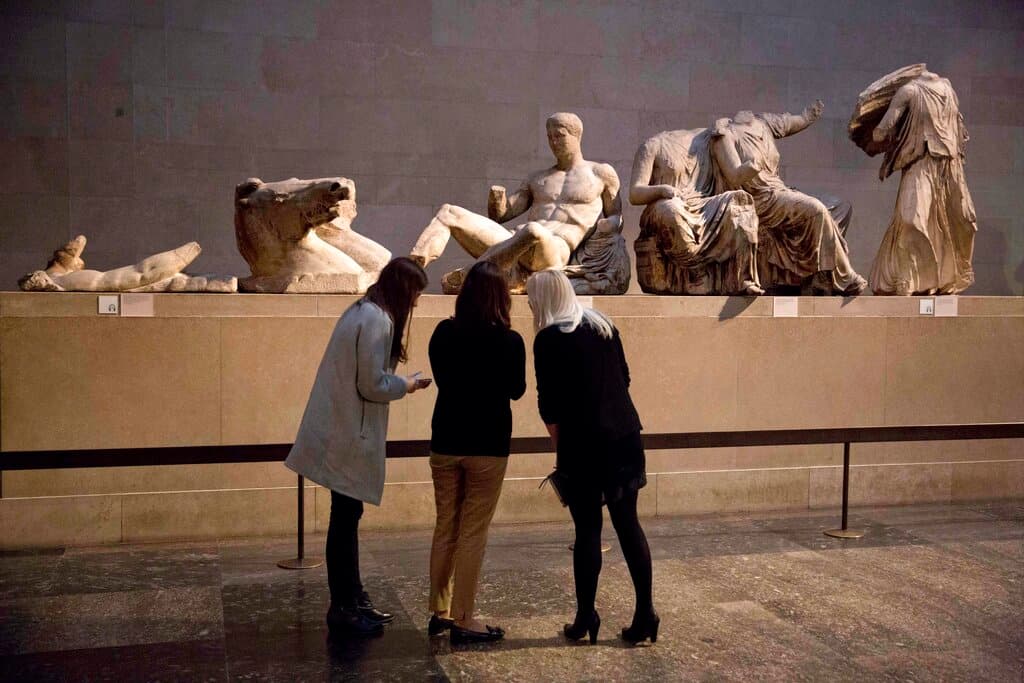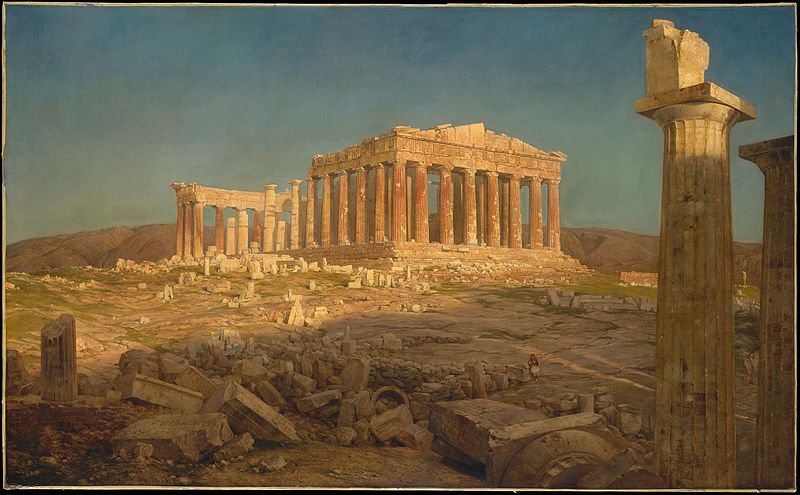Rishi Sunak, Sinking in Polls, Wades Into Mother of All Culture Wars as Athens Doubles Down on Calls for the Return to Greece of the Elgin Marbles
Greece and Great Britain are on the verge of an epic diplomatic showdown over what — if anything — to do about what is arguably the world’s most famous group of marble sculptures.

ATHENS — Pericles himself might be calling, but Rishi Sunak isn’t answering the phone. That is the diplomatic dynamic playing out between London and Athens right now as the epic tug-of-war over the Elgin Marbles escalates.
This phase of it started when the conservative Greek prime minister, Kyriakos Mitsotakis, told the BBC earlier this week that keeping the sculptures that once adorned the Parthenon in Greece but that have been in Britain for more than 200 years was like “cutting the Mona Lisa in half.” To say that Mr. Sunak was not amused by that comparison would be an understatement.
The British premier promptly canceled a high-profile meeting between the two leaders that had been scheduled at Downing Street on Tuesday. Then, during the Prime Minister’s Questions on Wednesday, Mr. Sunak took the extraordinary step of saying that Mr. Mitsotakis sought to “grandstand” over the disputed marbles.
For Mr. Mitsotakis, returning the sculptures to Greece is a matter of “reunification” and not “ownership.” Yet his electing to sound off on the matter while visiting London earlier this week, and on a matter of national pride for both Britons and Greeks, seems to have backfired.

Then again, too, there is a twist — Mr. Mitsotakis learned of the cancellation while he was meeting Monday evening with the Labor party leader, Sir Keir Starmer. Labor is leading Mr. Sunak’s Tories in recent polling by 20 percentage points. Mr. Sunak was said to be displeased that his Greek counterpart preferred to meet the opposition Labor leader first.
Mr. Starmer has also taken a different approach than Mr. Sunak. Labor has reportedly been more open to a deal on the Elgin marbles. Not that the frustration doesn’t cut both ways. Unusually for a Greek prime minister, Mr. Mitsotakis publicly expressed his “dismay” at the abrupt cancellation of the meeting
On social media, he said, “Greece’s positions on the issue of the Parthenon Sculptures are well known. I was hoping to have the opportunity to discuss them with my British counterpart as well, along with the major challenges of the international moment: Gaza, Ukraine, climate crisis, migration.”
With a bit of a taunt he added, “Anyone who believes in the correctness and justice of their positions is never afraid of opposing arguments.”

Initially the British government said that Mr. Sunak was simply unavailable, despite the fact that the lunchtime meeting had been previously scheduled. A spokesman then attempted to tamp down the friction, stating that “the UK-Greece relationship is hugely important. From our work together in NATO to tackling shared challenges like illegal migration, to joint efforts to resolve the crisis in the Middle East and war in Ukraine.”
Many Greeks remain skeptical. Some Greek officials, quoted anonymously in Greek newspapers, said that Mr. Sunak essentially treated with disdain an elected leader of a democratic country “as opposed to himself who was in effect an appointed prime minister.” For them it was “a mistake that sooner or later Sunak will have to face.”
Mr. Sunak’s decision to give Mr. Mitsotakis the brush-off can also also be read as a defense of what has over the years become a part of Britain’s cultural heritage as well as Greek. There were urban goings-on of all sorts atop the Acropolis long before the city of London existed, of course, but exhibitions of antiquities from all over the world are part of what lends the British capital, and the British Museum, its cosmopolitan appeal.
The dispute over the Elgin Marbles has been a longstanding open wound in Anglo-Greek relations. In the years between 1801 and 1804, during which time Greece was ruled by the Ottoman Empire, Lord Elgin, the British ambassador at Constantinople, ordered his agents to remove numerous sculptures from the Parthenon, causing — in the Greek view, at least — considerable damage in the process.
In 1806, the sculptures were shipped to Britain and ten years later the English government bought them. Since then, they have been a centerpiece of the British Museum at London’s Bloomsbury district.

Yet Greece considers it theft and maintains the sculptures must be returned to their place of origin, Athens. For their part, Britons claim that Elgin’s moves were made with the permission of the Ottoman Turks, although whether that deal held up according to standards of international law even during that distant time is still disputed.
Intriguingly, on the same day that Mr. Mitsotakis was meeting with Mr. Starmer at London, Greece’s brash new left-wing opposition leader, Stefanos Kasselakis, was invited to a private lunch at the residence of the American ambassador to Greece, George Tsounis. That meeting, specific details of which were not disclosed, might have drawn more media scrutiny had Mr. Mitsotakis not been away in Britain.
The chances of the marbles leaving London any time soon are not great and relations between London and Greece are durable enough to withstand the current hit. On Tuesday a Greek government spokesman, Pavlos Marinakis, said publicly that Athens does not want the tussle to take the form of a generalized crisis in Greek-British relations.
Yet with a general election looming in Britain and a changing political landscape in Greece, it is almost a certainty that ancient culture and modern politics will clash again in the new year. And that eventually someone will quote, once again, Lord Byron’s denunciation of his own countrymen: “Curst be the hour when from their isle they roved, / And once again thy hapless bosom gored, / And snatch’d thy shrinking gods to northern climes abhorred!”

